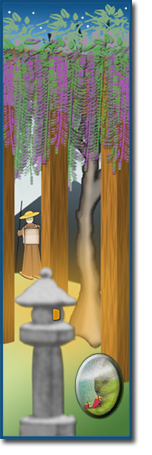On The Way: The Daily Zen Journal
Harmony – Part 1
Zhi Yi (538-597)

The word harmony is used here in the sense of harmonizing the five Dharma activities. The first is to regulate the times of eating and drinking. The second one is to regulate sleeping, the third is to regulate the body, the fourth is to regulate breathing, and the fifth is to regulate the heart-mind.
To explain why this is necessary, let us take an example from something near at hand, which applies even more to these regulations for meditation. It is like a potter in the secular world, who when she or he aspires to make all sorts of pottery, must first knead and prepare the clay carefully so that it is neither too hard nor too soft, and only then can he or she shape it on the wheel.
It is also like playing the lute; one must first tune the strings, so that they are neither too loose nor too tight and only then can the musician play it, and make beautiful melodies.
If you the practitioner wish to purify your heart, you must follow the above examples. To finely attune the five Dharma activities, you must harmonize them in a manner befitting the practice of samadhi (samatha, or Zen meditative concentration).
If there is some aspect that has not been regulated, it will be hard for you to overcome the many obstacles to meditation, or difficult for good roots to put forth shoots.
The first thing you must do is regulate the intake of food, that is, eating becomes a part of Dharma practice, something which assists the body to enter the Dharma path. Food when overindulged causes the Qi energy to become hard-pressed and the body listless, the arteries and veins obstructed, the heart closes off, not at peace when sitting in meditation.
If you eat too little, then the body will be tired and the heart hung up, the mind’s thoughts unsteady. If both of these, overeating and insufficient nourishment, are eliminated, then one can attain to the way of Zen concentration.
In addition to this, if you eat dirty and sullied things, your heart will become giddy and confused. If you eat things hard for the body to digest, then you’ll feel sick when moving and resting, and the four great things to be avoided will be overturned. This is what is called beginner’s Zen. You must plumb its depths.
Thus, the Buddhist canon says:
When the body’s at peace, the Zen way is enriched.
When eating and drinking, know what’s sufficient,
Take joy in a life of quiet seclusion,
The heart filled with joyful peace is energy-laden.
This is what is called the teaching of all Buddhas.
The second thing to regulate is sleep. Sleep is a time of darkness and doubt, which should not be indulged in. If you sleep too much, you not only waste time which could be spent in refining sacred meditation, you also lose precious time for Gongfu (kungfu) practice, and lead the heart-mind into darkness. If the roots of compassion are not deep, the first awakening to enlightenment will not be lasting.

Regulating sleep makes spirit and breath pure and clean and the heart bright and peaceful. If you can do this, your heart-mind will enter the realm of the sacred, and samadhi (concentration achieved in Zen meditation) will be manifest in you.
Thus the Buddhist canon says
If during the first night watch and the last night watch you waste your time, and do not during this time control sleep due to such causal conditions you will pass through your whole life empty, and nothing will be attained. You must consider the fact that an inconstant flame consumes all the many worlds, which you must free yourself from as early as possible, by not overindulging in sleep.
The third, fourth, and fifth things to regulate are the body, the breath, and the heart-mind. Since these three faculties are used together, they cannot be treated separately. Since there is a beginning, middle, and ending to the practice of meditation, there is a relative difference in how one enters into, abides in, and comes out of Zen contemplation.
When entering Zen meditation the first thing which you the practitioner must do, if you wish to enter samadhi (mental state of concentration focusing on one object), is to properly regulate the body. This must be done outside the state of meditation. Working, resting, walking, stopping, in motion or rest, whatever you do, you must in all things choose with care and discretion.
If your actions are coarse and rough, then your breath and Qi energy will follow in accord, for example, your Qi energy will become coarse, the heart-mind will be dissipated and hard to control, and when it’s time to sit in meditation you’ll find it a bother; the heart will not be at peace. Because of this, even when you are outside the state of meditation, you must still use your heart-mind in a way not contrary to the “skillful means” (Upaya) of meditation.

When beginning to meditate, it is necessary to make the body quite comfortable and at ease, in a suitable place. Thus at the beginning of meditation go to the woven chairs (set aside for Zen practice), and adjust the cushion on it so you can sit comfortably for a long time without undue hindrance.
Then, adjust the belt and monk’s robes a bit so that they are neat and won’t come undone when meditating. Next, attend to your hands. Lay the left hand, palm up, on top of the right palm, with the thumbs slightly touching. Place both palms thus held together on top of the left leg, and pull the two hands toward the body so that they come to rest beneath the navel, bringing calming peace to the heart.
Next, regulate the body by moving backward and forward and flexing the limbs and joints seven or eight times, as one does in self-massage, not letting arms and legs lean unevenly. Continue to adjust the body, by sitting up straight, keeping the back erect without sagging to the front or back. Then adjust the head and neck, so that the tip of the nose lines up with the belly button, bending neither left nor right, held neither too low nor too high, face even, and body settled properly.
Now open the mouth and exhale all impure Qi breath from the chest. The method of expelling the breath is: open the mouth and exhale breath, and as you let it go, see with your mind all of the divisions of the body, all of the blockages in the channels of the body, to be expelled with the breath as you exhale.
When done, close the mouth, and inhale pure clean air through the nose. Repeat this process three times. But if your body and breath are well regulated, once is enough.
At this point you must sit straight in the Zen position, just as if you were a stone, not letting the head, body, or limbs move. This is how when entering Zen meditation you are to regulate your body.
To sum it all up in a few words, the body should not be too loose or too rigid, if you want to keep the body regulated.
Zhi Yi (538-597)
Source – Zen is for Everyone The Xiao Zhi Guan text by Zhi Yi – translated by Michael Saso





No matter how many years we have practiced, or how many weeks, it is always refreshing to return to the beginning and look at meditation as if we are just being introduced to it. We can all benefit from a return to beginner’s mind.
If you can pick up even one new way to look at things we all take for granted, that provides another way to bring mindfulness into mechanical mind, our all too normal state.
Looking at the activities of daily life as part of Dharma, eating, drinking, and sleeping, helps to bridge what seems like a gap between worldly actions and meditation. Rather than divide up the world into the things we do when we aren’t meditating and our meditation times, it’s refreshing to cross into a world where everything matters.
This is the first part of the chapter on Harmony, which will be followed by Zhe Yi’s teaching on breathing and then regulating the mind. Without getting hung up on all the diverse theories of eating, sleeping, and posture, it would do us all well to just listen to our own bodies and see if we can find the middle way in our approach.
There are a few universal prescriptions, but most important is to experiment and listen to what your own body communicates. And that we can only find out by listening with awareness.
Walking in the green of Spring,
Elana, Scribe for Daily Zen